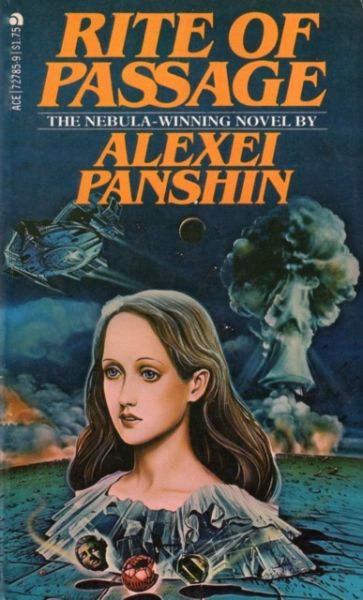Lost Voices 11: Rite of Passage by Alexei Panshin
Rite of Passage
By Alexei Panshin

1 May, 2000
0 comments
Rite of Passage
Alexei Panshin
Ace Books [1968]
254 pages
Synopsis: Mia Havero lives on a giant starship [A back of the envelop calculation shows the volume of the ship is on the order of 10,000 cubic kilometers]. Originally built to ferry colonists from an overcrowded Earth to colony worlds, after Earth’s self-destruction, the ship’s crew put it and its seven sister ships to use as living quarters and a base of power over the less advanced colonies, with whom they trade carefully hoarded information for resources. The Ships tolerate no misbehavior from colony worlds: around twenty of the colony worlds have been ‘morally disciplined’, wiped out from space.
Mia is nearly old enough to be send on her culture’s rite of passage, after which she will be counted as an adult. The Ship folk drop their kids on colonial worlds where they must survive for 30 days on their own, with only minimal equipment. Mia is not enthusiastic about the trial [although not terrified either]. Her more immediate concern is that her father is moving them from the section of the ship they have lived for all of her life to another one, and since Mia is mildly xenophobic and conservative, she is alarmed at this change.
We then see her over the course of the year leading up to the trial. Various aspects of Ship culture are shown through her initially unintrospective eyes, from the casual distain for ‘colons’ as the colonists are called, to the harsh treatment handed out to people who violate the Ship’s population control laws. Although she starts off very much the daughter of her father, she gradually develops her own independent views.
Matters come to a head when she is dropped for her Trial, along with 30 other kids, on Tintera, a colony world which as far as the Ship knows has been virtually uncontacted since it was settled. The colonists are extremely hostile to the Ships, who they feel have kept the colonies in poverty by keeping the technological and scientific knowledge of Earth for themselves. Mia only narrowly escapes being killed several times.
She manages to rescue her boyfriend from the legal authority of the colonists’ repressive government but is unable to save a kindly old man who helped her: he is beaten to death for having improper political views. Almost half the kids don’t survive this Trial.
The Ships’ crew tries Tintera in absentia. Although many of the kids oppose the measure [and despite the fact that the planet has natives, possibly intelligent, who have been enslaved by the humans], the adult part of the crew vote to destroy Tintera. Mia has enough independence to disagree with her father and it is suggested that while the majority of’ the crew are too conservative to change their ways, the kids are not and with time will come to dominate the political world of the Ships.
This is a real gem of a book. I came across it when Ace reprinted it and I ‑think- the Anthony Villiers novels in the late 1970s. At 254 pages, it is just as long as the story requires. Panshin does a nice job of showing the details of life on the Ship and the emptiness of the Ship-culture, which despite its advanced abilities really is parasitic, both on the colonies and on dead Earth from whom all its knowledge came: the Ship folks are extremely unproductive in research and the arts.
There’s a nice bit of skin-colour throw away in Rite of Passage , which doesn’t seem to get cited nearly as often as Johnny Rico’s skin colour does.
As it happens, unlike most authors in this series of reviews, Panshin is both alive and easily accessible so I asked him why it was we haven’t seen any fiction from him in almost 20 years. I quote with permission:
* * * * *
Dear James,
I think my problem may be that my novels please readers better than editors and publishers. It’s only an impression, but I think the commercial publishing industry saw what I wrote as slowly produced, deliberately odd, and commercially marginal.
A few months ago, I had an inquiry into Rite of Passage from a trade paperback line. They told me that it would be an honor to have the book on their list. But when I asked a question or two, I discovered that the money they were offering was their standard offer “for many years” for a slush pile manuscript.
Right now, I’m writing song lyrics and material for my webpage, including my recent essay on the genesis of Rite of Passage . I have a couple more essays that I want to complete. In the long run, I can see the website as a way of reaching a readership without a publisher serving as a filter and the possibility of taking up fiction writing again.
Yours,
Alexei Panshin
* * * *
Panshin’s webpage is http://www.enter.net/~torve/index.html
Of course, as well as fiction, Alexei Panshin has produced works of SF criticism of which Heinlein in Dimension and Science Fiction in Dimension are but two. Sadly, fans of his fiction will be forced to look for copies in used bookstores [and on Panshin’s website, where he has several books for sale].
Next: And Having Writ… , Donald Benson
